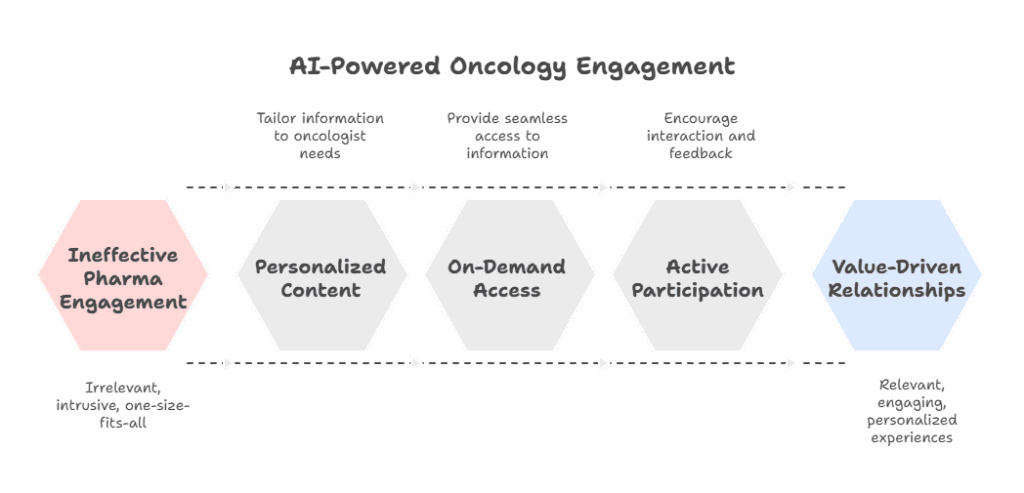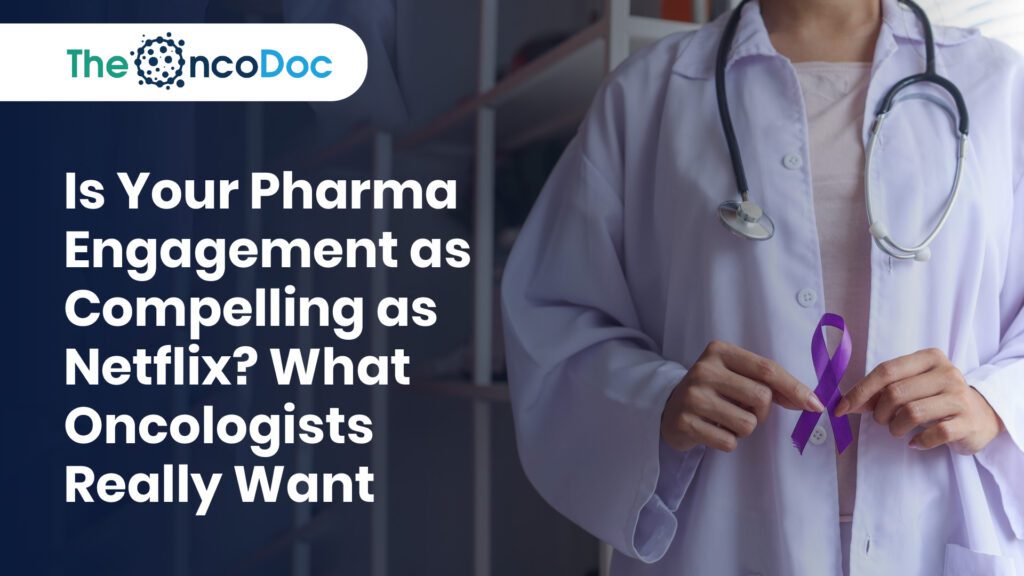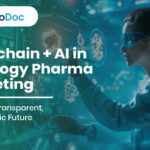Abstract
In an era saturated with information and personalized digital experiences, healthcare professionals (HCPs), particularly oncologists, have developed heightened expectations for how they consume professional content. Just as streaming services like Netflix have mastered delivering tailored, on-demand, and highly engaging experiences, oncologists now seek a similar level of relevance, convenience, and personalization from pharmaceutical company engagement. This article explores the “Netflix Effect” in the context of US oncology, analyzing how the ubiquitous consumer expectation for hyper-personalized, value-driven, and seamlessly delivered content is reshaping oncologists’ preferences for interacting with pharma. We delve into the critical factors that drive oncologist engagement, including the demand for highly relevant scientific information, flexible access, diverse content formats, and a perception of genuine value beyond mere product promotion. Furthermore, this article provides a comprehensive analysis of how Artificial Intelligence (AI) is revolutionizing pharmaceutical digital marketing, enabling pharma managers to meet and exceed these evolving expectations. Through an examination of AI-driven content personalization, predictive analytics for engagement, omnichannel orchestration, and real-time feedback loops, we illustrate how AI empowers pharma to deliver “binge-worthy” scientific and educational content. The discussion incorporates data and insights specific to the US oncology market, offering actionable strategies for pharma managers to transform their engagement models, foster deeper relationships with oncologists, and ultimately enhance the dissemination of critical medical knowledge.

Introduction: From Generic Pitches to Personalized Playlists – The New Era of Oncologist Engagement
The digital revolution has profoundly altered how individuals consume information, connect with brands, and manage their daily lives. In the consumer realm, platforms like Netflix, Spotify, and Amazon have set a new standard, offering personalized recommendations, on-demand access, and highly engaging content tailored to individual preferences. This ubiquitous “Netflix Effect” has permeated every aspect of modern life, subtly but significantly shaping expectations – even among highly specialized professionals like oncologists.
In the complex and rapidly evolving world of oncology, time is a precious commodity. Oncologists are constantly grappling with an explosion of new data, complex treatment algorithms, regulatory changes, and an ever-increasing patient load. Against this backdrop, traditional, one-size-fits-all pharmaceutical engagement models – whether through generic sales calls or uncurated mass emails – are increasingly ineffective and often perceived as intrusive or irrelevant. Oncologists, as discerning consumers of professional information, are no longer content with being passive recipients; they demand active participation, personalized value, and seamless access to the information they need, when and how they need it.
This article posits that pharmaceutical companies must embrace the principles underlying the “Netflix Effect” to re-imagine their engagement strategies in the US oncology market. We will explore what truly drives oncologist’ attention in this demanding environment, dissecting their preferences for content, delivery channels, and interaction styles. Crucially, we will then demonstrate how Artificial Intelligence (AI) is not merely a technological enhancement but the fundamental engine that enables pharma to meet these elevated expectations, delivering highly relevant, on-demand, and deeply engaging experiences that truly resonate with oncologists. By understanding and harnessing AI, pharma managers can move beyond transactional interactions to build enduring, value-driven relationships that mirror the personalized satisfaction of a perfectly curated Netflix playlist.

The Netflix Effect in Action: Deconstructing Oncologist Engagement Preferences
To understand what oncologists want, we must look beyond traditional metrics and consider the underlying principles that make consumer digital experiences so compelling.
1. Hyper-Personalization: “Just for You” Content
- The Netflix Analogy: Netflix doesn’t show the same homepage to everyone. Its algorithms analyze viewing history, ratings, and even time of day to recommend shows and movies “just for you,” often discovering content you didn’t know you wanted.
- Oncologist Expectation: Oncologists are overwhelmed by generic information. They want scientific content tailored to their specific sub-specialty (e.g., GI oncology, hematologic malignancies, breast cancer), their patient demographics, their research interests, and even their preferred learning style. A lung cancer specialist in an academic setting needs different information, presented differently, than a community oncologist focused on breast cancer.
- The Gap: Too often, pharma pushes broad product messages rather than deeply personalized, educational content that addresses an oncologist’s unique practice challenges or scientific curiosities.
2. On-Demand & Seamless Access: Anytime, Anywhere
- The Netflix Analogy: Content is available 24/7 on any device. You can start watching on your TV, pause, and pick up on your tablet later, seamlessly.
- Oncologist Expectation: Oncologists operate on demanding schedules. They need access to scientific data, clinical trial updates, expert opinions, and educational resources whenever and wherever it’s convenient for them. This means mobile-friendly content, easily searchable digital libraries, and asynchronous learning opportunities. They don’t want to wait for a sales rep’s visit or a scheduled webinar if they need information now.
- The Gap: While digital channels exist, many pharma resources are still siloed, not optimized for mobile, or require multiple logins and cumbersome navigation, creating friction that leads to abandonment.
3. Diverse, Engaging Formats: Beyond the White Paper
- The Netflix Analogy: While movies are popular, Netflix offers series, documentaries, stand-up specials, and interactive content. Variety keeps engagement high.
- Oncologist Expectation: Not all learning happens through reading long PDFs. Oncologists appreciate diverse content formats: short video summaries of clinical trials, interactive case studies, expert panel discussions (live or recorded), podcasts during commutes, infographics, and quick-reference guides. The format should match the complexity of the information and the oncologist’s available time.
- The Gap: Pharma often defaults to traditional formats (slide decks, lengthy articles) that may not be the most effective for information retention or engagement in a time-poor environment.
4. Predictive Value & Proactive Curation: “What’s Next for You?”
- The Netflix Analogy: Beyond explicit requests, Netflix often recommends content based on subtle signals, anticipating what you might enjoy next.
- Oncologist Expectation: Oncologists appreciate content that anticipates their needs – perhaps a summary of an upcoming clinical trial relevant to their patient population, or an article on managing a side effect they’ve recently encountered in practice. This moves beyond merely responding to explicit searches to proactively delivering highly valuable insights.
- The Gap: Many pharma interactions are reactive or broad. Proactive, intelligent curation based on an understanding of an oncologist’s evolving professional journey is rare.
5. Authenticity and Trust: Quality Over Quantity
- The Netflix Analogy: While not every show is a hit, Netflix invests heavily in high-quality, original content, building trust with its audience.
- Oncologist Expectation: Oncologists are highly skeptical of overt promotional content. They seek objective, evidence-based scientific information, presented transparently. They value insights from key opinion leaders (KOLs) and peer-to-peer discussions. The goal is genuine scientific exchange and education, not just a sales pitch.
- The Gap: Pharma sometimes struggles to balance promotional goals with the need for authentic, unbiased scientific communication, leading to a perception of commercial bias that erodes trust.

The AI Engine: Powering the “Netflix Effect” in Oncology Marketing
Artificial Intelligence is the lynchpin for pharma companies to meet these evolving oncologist expectations. It provides the analytical power, personalization capabilities, and operational efficiency needed to transform engagement from generic to genuinely compelling.
1. AI-Driven Hyper-Personalization: The Algorithm as Your Medical Librarian
- How AI Works: Machine Learning algorithms can analyze vast amounts of structured and unstructured data: an oncologist’s digital footprint (website visits, content downloads, virtual event attendance), professional profiles (sub-specialty, affiliations), anonymized prescribing patterns (where permissible), scientific publications, clinical trial involvement, and even their stated preferences.
- Implementation: An AI system can create a detailed “profile” for each oncologist. If an oncologist frequently downloads articles on precision medicine in NSCLC and attends webinars on EGFR mutations, AI will prioritize delivering new data on innovative therapies targeting those specific mutations, perhaps in a video summary format they prefer, directly to their preferred professional platform. This is the ultimate “just for you” content experience.
2. Predictive Engagement & Intelligent Outreach: Anticipating Needs
- How AI Works: Predictive analytics uses historical engagement data, external market signals (e.g., new drug approvals, guideline updates), disease prevalence trends, and even sentiment analysis (from public professional forums) to forecast when and how an oncologist is most likely to engage with specific content or a human interaction.
- Implementation: If an AI model detects that a group of oncologists in a specific region is starting to research a particular biomarker due to a recent guideline change, it can trigger a proactive, targeted campaign delivering relevant scientific data on therapies linked to that biomarker. This transforms outreach from reactive to anticipatory, ensuring that content arrives precisely when it’s most valuable.
3. Omnichannel Orchestration & Seamless Experience: Your Personalized Journey
- How AI Works: AI integrates data across all engagement channels (email, web, virtual events, sales rep interactions, professional networks). It tracks an oncologist’s journey, ensuring continuity and consistency across touchpoints. NLP can analyze interactions to refine future communications.
- Implementation: An oncologist might start a virtual education module on a company’s website. If they don’t complete it, AI can trigger a personalized email with a link to pick up where they left off, or a brief summary of the key takeaways, delivered through their preferred channel. If they then show interest in a related therapy, AI can brief their sales rep with these insights, allowing for a highly informed and relevant in-person discussion.
4. AI-Powered Content Generation & Curation: Scaling Quality
- How AI Works: Generative AI (e.g., Large Language Models) can assist in drafting initial content, summarizing complex clinical trial results into concise bullet points, creating educational outlines, or even generating interactive visuals. NLP can analyze vast scientific literature to identify emerging trends or key publications relevant to specific oncologist segments.
- Implementation: Pharma can leverage AI to rapidly create personalized summaries of new data releases, tailoring the language and focus for different sub-specialties. For example, an AI could quickly generate a bulleted summary of a Phase III trial’s safety profile specifically for community oncologists, while creating a more in-depth mechanistic overview for academic researchers. Human medical review remains paramount for accuracy and compliance.
5. Real-time Feedback & Continuous Optimization: Always Improving
- How AI Works: AI continuously monitors engagement metrics (open rates, click-throughs, time spent on content, completion rates, feedback scores). It identifies patterns of successful engagement and areas of disengagement, providing immediate insights for optimization.
- Implementation: If a particular format of a webinar is consistently leading to high drop-off rates, AI can flag this and suggest alternative structures or interactive elements for future events. This iterative, data-driven approach ensures that pharma’s engagement strategies are constantly refined and improved, much like how streaming services constantly tweak their algorithms to improve user experience.

The US Oncology Landscape: Why AI is Indispensable
The specific dynamics of the US oncology market amplify the need for AI-driven engagement:
- High Volume, High Value: The US market represents a significant portion of global oncology drug revenue, making effective oncologist engagement critical.
- Rapid Innovation: The US sees a disproportionate share of new drug approvals and clinical trials in oncology. AI is crucial for keeping oncologists abreast of this rapid pace of innovation.
- Fragmented Healthcare System: A diverse mix of academic centers, large hospital systems, and independent community practices means engagement strategies must be highly adaptable. AI can segment and tailor messages effectively.
- Data Availability: The US healthcare system generates enormous amounts of patient data, clinical trial data, and real-world evidence, providing a rich foundation for AI-driven insights (with strict anonymization and privacy protocols).
- Competitive Intensity: The oncology market is highly competitive. Differentiated, high-value engagement can be a key competitive advantage.
Navigating the Future: Challenges and Ethical Considerations
While AI offers immense potential, successful implementation requires careful navigation:
- Data Integrity and Privacy: The ethical collection, storage, and utilization of data, especially patient-related data (even anonymized), must adhere to the highest standards of HIPAA and other privacy regulations. Transparency with HCPs about data usage is crucial.
- Algorithm Bias: Ensuring AI algorithms are free from bias is critical to avoid reinforcing existing disparities in care or misrepresenting scientific information.
- Maintaining Trust and Authenticity: While AI can personalize, the ultimate goal is to build trust. Content must remain scientifically accurate, unbiased, and ethically sound. The human element of medical expertise and empathy cannot be replaced.
- Integration Complexity: Integrating AI solutions with existing CRM, marketing automation, and medical affairs systems can be complex and requires significant investment in infrastructure and talent.
- Compliance Oversight: All AI-driven content generation and engagement strategies must be meticulously reviewed by medical, legal, and regulatory teams to ensure full compliance with FDA and other pharmaceutical marketing regulations.

Conclusion: From Information Overload to Intelligent Engagement
The “Netflix Effect” is not just about entertainment; it’s about the expectation for highly personalized, on-demand, and value-driven experiences. In the demanding world of oncology, pharmaceutical companies that ignore this evolving expectation do so at their peril. Oncologists are no longer passive recipients of information; they are discerning professionals seeking intelligent partners who understand their unique needs and deliver insights with precision and respect for their time.
Artificial Intelligence is the transformative force that enables pharma managers to transition from outdated, generic marketing tactics to sophisticated, hyper-personalized engagement strategies. By harnessing AI for predictive analytics, personalized content delivery, omnichannel orchestration, and continuous optimization, pharmaceutical companies can create a truly “binge-worthy” experience for oncologists – one that seamlessly delivers critical scientific information, fosters genuine scientific exchange, and ultimately contributes to better patient outcomes. The future of oncology marketing is not just digital; it is intelligently personal, driven by AI, and designed to engage, educate, and empower the oncologists at the forefront of cancer care. Those who embrace this shift will not only capture attention but will forge invaluable, lasting partnerships in the new era of medicine.
The Oncodoc team is a group of passionate healthcare and marketing professionals dedicated to delivering accurate, engaging, and impactful content. With expertise across medical research, digital strategy, and clinical communication, the team focuses on empowering healthcare professionals and patients alike. Through evidence-based insights and innovative storytelling, Hidoc aims to bridge the gap between medicine and digital engagement, promoting wellness and informed decision-making.



